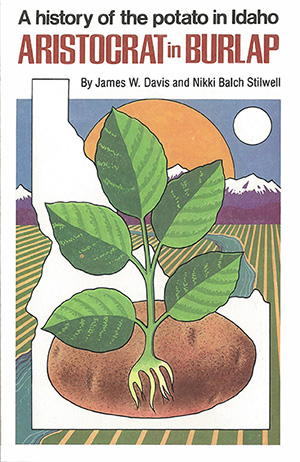 Inset; U of I Ag. College Dean, A. Larry Branen, welcomes visitors to the dedication of the U of I storage research building at Kimberly, Idaho. Cutting ribbon, l to r: Gary Lee, asst. dean; Gale Kleinkopf, station supt.; Dean Branen, Jack Parks, IPC chairman; Jeff Raybould, PGI president; Tom Bell, U of I provost, and Larry O'Keefe, plant, soil and entomological sciences head.
Inset; U of I Ag. College Dean, A. Larry Branen, welcomes visitors to the dedication of the U of I storage research building at Kimberly, Idaho. Cutting ribbon, l to r: Gary Lee, asst. dean; Gale Kleinkopf, station supt.; Dean Branen, Jack Parks, IPC chairman; Jeff Raybould, PGI president; Tom Bell, U of I provost, and Larry O'Keefe, plant, soil and entomological sciences head.
In reviewing research results over the years, it is clear that the financial benefits to the industry that resulted from the research and education (R and E) programs have far exceeded the total investment by all three contributors.
Professor Walter Sparks evaluates the contributions of U of I research programs to the potato industry in the area of potato storage where he did the major part of his research.
Sparks says that the ability to store potatoes from one crop to the next is probably the greatest research-created benefit in economic terms. It allows Idaho shippers to market fresh potatoes 12 months of the year, which is vital in maintaining customer relationships and market share. It also makes it possible for processing plants to operate the full season, which gives the processor a better return on the money invested in plant facilities. Workers benefit from the availability of year-round jobs and the communities from the increased economic activity.
Other university research that has made significant contributions to the Idaho® potato industry includes an ongoing program in irrigation practices. Improvements in yield and quality have resulted and savings have been made in preventing the leaching of fertilizers and in more-efficient water use.
The virus-free program that has made it possible for seed-potato growers to provide seed free of Virus X and Virus to commercial growers is another U of I achievement noted by Sparks. The presence of seed-born virus reduces yield and quality.
Partial or complete control of weeds, wireworms, nematodes, verticillium wilt, potato scab, ringrot, Colorado potato beetle, leaf roll, and blight have been achieved through the work of the staff of U of I scientists. Without the ability to deal with these cultural problems, Idaho growers would probably be unable to produce an acceptable product at a price consumers could afford.
Research and development in the mechanical handling of potatoes to prevent bruise damage have produced design innovations that have been adapted by the manufacturers of farm equipment. As an example, pilers and harvesters are now designed to minimize drops and rough handling of tubers.


 Inset; U of I Ag. College Dean, A. Larry Branen, welcomes visitors to the dedication of the U of I storage research building at Kimberly, Idaho. Cutting ribbon, l to r: Gary Lee, asst. dean; Gale Kleinkopf, station supt.; Dean Branen, Jack Parks, IPC chairman; Jeff Raybould, PGI president; Tom Bell, U of I provost, and Larry O'Keefe, plant, soil and entomological sciences head.
Inset; U of I Ag. College Dean, A. Larry Branen, welcomes visitors to the dedication of the U of I storage research building at Kimberly, Idaho. Cutting ribbon, l to r: Gary Lee, asst. dean; Gale Kleinkopf, station supt.; Dean Branen, Jack Parks, IPC chairman; Jeff Raybould, PGI president; Tom Bell, U of I provost, and Larry O'Keefe, plant, soil and entomological sciences head.